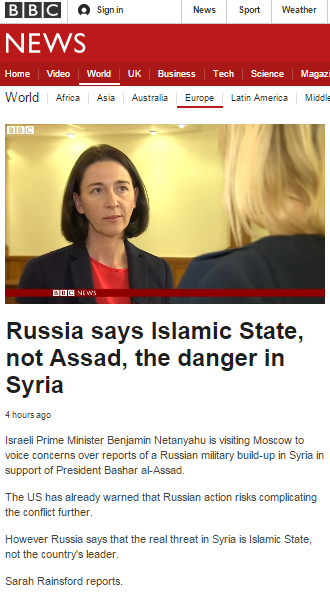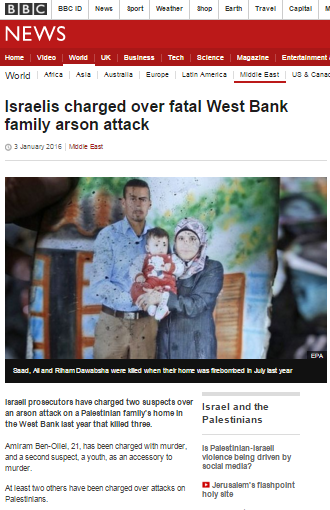Just three weeks ago the synopsis to a filmed report appearing on the BBC News website told its visitors that:
“Syria’s Deputy Foreign Minister Faisal Mekdad, has said that the refugee crisis unfolding in Europe is the direct result of terrorist aggression against Syria.
He blamed Islamist militants for forcing thousands from their homes and said the government had helped millions of displaced people.”
In the report itself, BBC audiences heard Faisal Mekdad say:
“The Syrian army has never, ever attacked or initiated any attack against a city or against a village and if you see at least the most recent attacks you will see them initiated by the terrorist factions and when these terrorist groups attack villages and cities you see a very big flood of people leaving those areas.”
On September 21st the BBC News website’s Europe and Middle East pages carried a filmed report by the corporation’s correspondent in Moscow, Sarah Rainsford, which was promoted under the headline “Russia says Islamic State, not Assad, the danger in Syria” and that message was repeated in the synopsis:
“Israeli Prime Minister Benjamin Netanyahu is visiting Moscow to voice concerns over reports of a Russian military build-up in Syria in support of President Bashar al-Assad.
The US has already warned that Russian action risks complicating the conflict further.
However Russia says that the real threat in Syria is Islamic State, not the country’s leader.” [emphasis added]
In the report itself viewers heard Rainsford say:
“Russia’s line is clear: the real danger in Syria today is Islamic State.”
They then heard from a Russian foreign ministry spokesperson:
“Absolutely for sure we know that [the] terrorist threat in Syria is something very dangerous and it’s very dangerous not only for [the] Middle East region but also for Europe and also for Russia.”
It is of course perfectly reasonable for the BBC to report statements from interested parties such as the Syrian deputy foreign minister or his regime’s Russian and Iranian allies just as long as audiences are also given the background facts which would enable them to put such statements into their correct context.
These two examples join previous reports in which no such background information has been provided, with the result being that BBC audiences are being steered towards a grossly simplistic and distorted view of the conflict in Syria which does nothing to meet the corporation’s obligation to “build a global understanding of international issues”.




